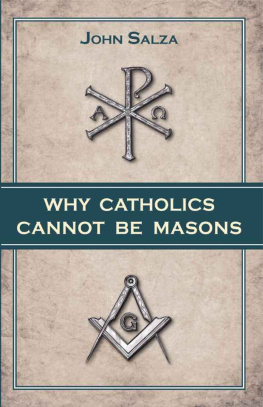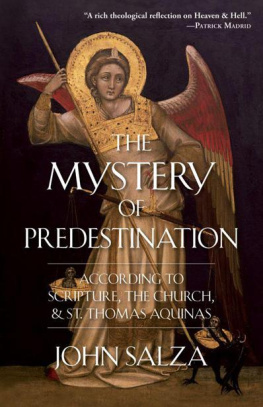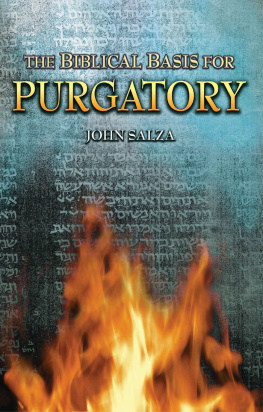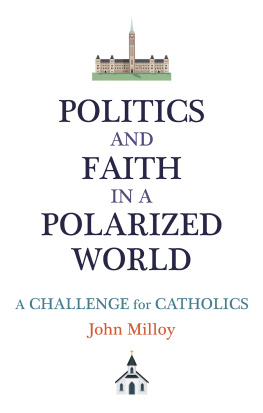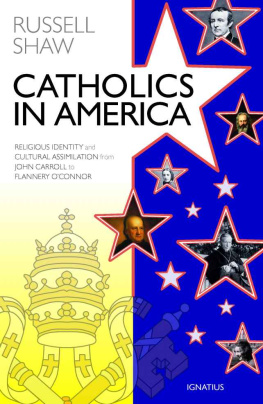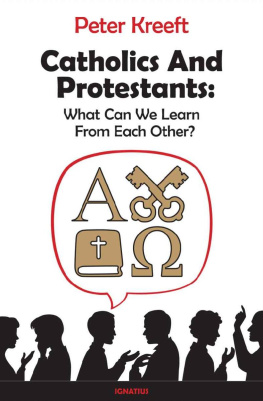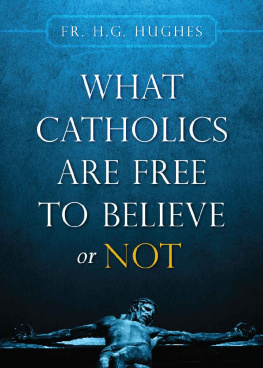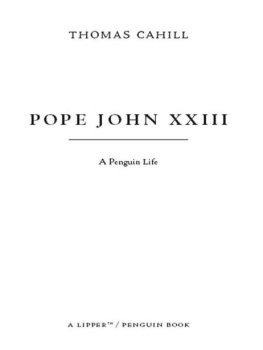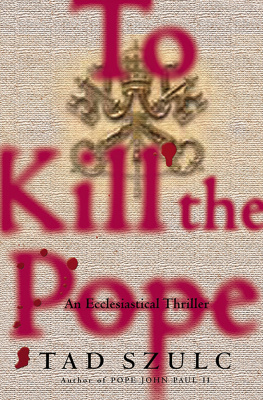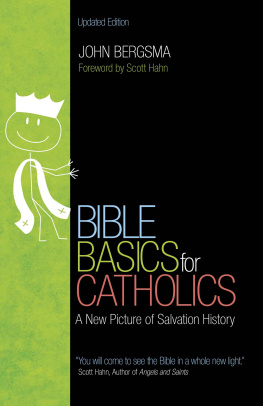John Salza - Why Catholics Cannot Be Masons
Here you can read online John Salza - Why Catholics Cannot Be Masons full text of the book (entire story) in english for free. Download pdf and epub, get meaning, cover and reviews about this ebook. year: 2011, publisher: TAN Books, genre: Religion. Description of the work, (preface) as well as reviews are available. Best literature library LitArk.com created for fans of good reading and offers a wide selection of genres:
Romance novel
Science fiction
Adventure
Detective
Science
History
Home and family
Prose
Art
Politics
Computer
Non-fiction
Religion
Business
Children
Humor
Choose a favorite category and find really read worthwhile books. Enjoy immersion in the world of imagination, feel the emotions of the characters or learn something new for yourself, make an fascinating discovery.
- Book:Why Catholics Cannot Be Masons
- Author:
- Publisher:TAN Books
- Genre:
- Year:2011
- Rating:3 / 5
- Favourites:Add to favourites
- Your mark:
- 60
- 1
- 2
- 3
- 4
- 5
Why Catholics Cannot Be Masons: summary, description and annotation
We offer to read an annotation, description, summary or preface (depends on what the author of the book "Why Catholics Cannot Be Masons" wrote himself). If you haven't found the necessary information about the book — write in the comments, we will try to find it.
John Salza: author's other books
Who wrote Why Catholics Cannot Be Masons? Find out the surname, the name of the author of the book and a list of all author's works by series.
Why Catholics Cannot Be Masons — read online for free the complete book (whole text) full work
Below is the text of the book, divided by pages. System saving the place of the last page read, allows you to conveniently read the book "Why Catholics Cannot Be Masons" online for free, without having to search again every time where you left off. Put a bookmark, and you can go to the page where you finished reading at any time.
Font size:
Interval:
Bookmark:
Cannot
Be Masons
Whosoever revolteth, and continueth not in the doctrine of Christ, hath not God. If any man come to you, and bring not this doctrine, receive him not into the house nor say to him, God speed you. For he that saith unto him, God speed you, communicateth with his wicked works.
2 John 1:9-11
Cannot
Be Masons
By
John Salza
Bear not the yoke with unbelievers. For what participation hath justice with injustice? Or what fellowship hath light with darkness? And what concord hath Christ with Belial? Or what part hath the faithful with the unbeliever? And what agreement hath the temple of God with idols? For you are the temple of the living God. Wherefore, Go out from among them, and be ye separate, saith the Lord, and touch not the unclean thing. 2 Corinthians 6:14-17
TAN Books
Charlotte, North Carolina
Nihil Obstat: | Charles McNamee, J.C.L. |
Imprimatur: | + Thomas G. Doran, D.D., J.C.D. |
The Nihil Obstat and Imprimatur are official declarations that a published book or pamphlet is free of doctrinal or moral error. No implication is contained therein that those who have granted the Nihil Obstat and Imprimatur agree with the contents, opinions or statements expressed.
Copyright 2008 by John Salza.
All rights reserved. Brief selections of text from this book may be quoted or copied for non-profit use without permission, and brief selections may be quoted by a reviewer in a review without permission. Otherwise, no part of this book may be reproduced or transmitted in any form or by any means, electronic or mechanical, including photocopying, recording, or by any information storage or retrieval system, without permission in writing from the Publisher.
Grateful acknowledgment to Our Sunday Visitor Press for permission to use material from the glossary of Masonry Unmasked, by John Salza, OSV, 2006.
ISBN 978-0-89555-881-7
Cover design by Milo Persic. The upper panel shows the Chi Rho (pronounced Kee-Roe and formed from the X and P of the Greek alphabet), a symbol of Christ, along with the Alpha and Omega, the first and last letters of the Greek alphabet, which together represent God. In Apocalypse 1:8 these letters are used to designate the Eternal Father and in Apocalypse 21:6 and 22:13 God the Son as eternal, self-existent, infinite being itself. I am Alpha and Omega, the beginning and the end, saith the Lord God. ( Apoc . 1:8). (Attwater, Catholic Dictionary, p. 16). The lower panel features the Masonic square and compass and letter G; the G stands for God and Geometry.
Printed and bound in the United States of America.
TAN Books
Charlotte, North Carolina
2008
To the Blessed Virgin Mary,
Who, as Our Lady of Good Success
at Quito, Ecuador,
warned of the evil of Masonry,
And who will conquer all heresies through the
Triumph of her Immaculate Heart.
An author, lawyer and noted Catholic apologist, John Salza is a former 32nd Degree Scottish Rite Freemason and Shriner. He was a member of two Masonic Lodges in Milwaukee, serving as Junior Deacon, Senior Deacon and Junior Warden. The Grand Lodge of Wisconsin awarded him the distinguished Proficiency Card in recognition of his expertise in Masonic ritual. This credential authorized him to instruct other Masons in how to perform the rituals of Freemasonry. In addition to teaching Masonic ritual, John Salza proposed many changes to Wisconsins Masonic ritual, which were adopted by the Masonic Grand Lodge of Wisconsin. He also played major roles in performing the rituals of Scottish Rite Freemasonry and the Shriners.
After investigating the Catholic Churchs teachings on Freemasonry, Salza renounced his Masonic membership in 1999. In thanksgiving to God for the grace he had received, he has devoted himself to Catholic apologetics. He created the popular website www.ScriptureCatholic.com and is the author of the following books published by Our Sunday Visitor: Masonry Unmasked: An Insider Reveals the Secrets of the Lodge; The Biblical Basis for the Catholic Faith; The Biblical Basis for the Papacy; The Biblical Basis for the Eucharist; The Biblical Basis for Tradition, and The Biblical Basis for Purgatory. John Salza is a frequent guest and host on Catholic radio and has his own daily feature on Relevant Radio: Relevant Answers. Mr. Salza has also appeared on Eternal Word Television Network (EWTN), and he has a daily apologetics program on EWTN Radio called Catholic Q&A.
Cannot
Be Masons
He that believeth and is baptized, shall be saved: but he that believeth not shall be condemned.
Mark 16:16
Organization?
Remember that Christianity and Masonry are essentially irreconcilable, such that to join one is to divorce the other.
Pope Leo XIII1
Many people believe that Masonryalso called Freemasonryis a harmless fraternal organization devoted to making good men better and to helping society at large. They see little difference between Masonry and fraternities such as the Knights of Columbus. Like the Knights of Columbus, Masons conduct fundraising activities, donate money to charities and hold social events for their members and families. Masons are often upstanding citizens who profess a love for God and neighbor. Many prominent men of society have also been Masons. In light of these characteristics, many peopleincluding some Catholic priestsdo not understand the reason for the Catholic Churchs opposition to Freemasonry. Why is that?
Primarily it is because the general public has no idea what Freemasonry teaches inside its lodge rooms about God and salvation. When a man becomes a Mason, he is required to swear oaths of secrecy, promising never to reveal the teachings of the Lodge. The Mason swears these oaths at an altar, on the Bible (if he is Christian), and under symbolic penalties of mutilation and death. He is repeatedly warned that if he ever revealed the teachings of the Order to non-Masons (whom Masonry terms profanes), he would be worthy of the death penalty and the contempt and detestation of all good Masons.2
Because most Masons take these warnings seriously, they do not reveal Freemasonrys secret religious teachings to non-Masons. Instead, when discussing their organization with profanes, Masons focus on the positive aspects of Masonry, such as its social or charitable activities. They concentrate on how much good Masonry does and not on what Masonry teaches. Thus, the publics understanding of Freemasonry comes almost exclusively from what it sees and hears from Masons. This understanding invariably excludes any knowledge of Masonrys explicit teachings about its deistic understanding of God, its belief in salvation by works, and its most sublime religious doctrinethe resurrection of the body.
The Catholic Church, of course, knows better. As the spotless Bride of Christ who is guided by the Holy Ghost, she knows when error threatens the souls of her members. She knows when heretical teaching seeks to undermine Catholic truth. This is why no fewer than 12 Popes have individually issued two dozen condemnations of Freemasonry since 1738 on the grounds that Masonrys teachings are incompatible with the Catholic Faith. (See Appendix A for a list of these pronouncements.) The Church has declared that any Catholic who joins Freemasonry puts himself in a state of grave (that is, mortal) sin and cannot receive the Eucharist.
Many Catholic Masons in the United States are quick to dismiss the perennial teachings of the Popes as not relevant to their personal situations. They pretend that the Churchs repeated condemnations apply only to European Masonry, but not to their American lodges or rituals. Some even contend that the Popes condemnations were politically motivated. In other words, they convince themselves that the Vicars of Christ were ignorant and made rash judgments against Masonry. This is a most serious error.
Font size:
Interval:
Bookmark:
Similar books «Why Catholics Cannot Be Masons»
Look at similar books to Why Catholics Cannot Be Masons. We have selected literature similar in name and meaning in the hope of providing readers with more options to find new, interesting, not yet read works.
Discussion, reviews of the book Why Catholics Cannot Be Masons and just readers' own opinions. Leave your comments, write what you think about the work, its meaning or the main characters. Specify what exactly you liked and what you didn't like, and why you think so.

